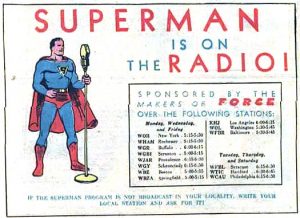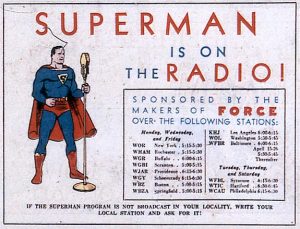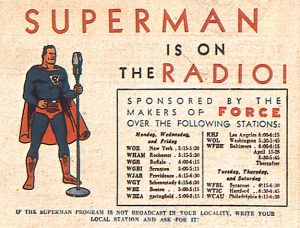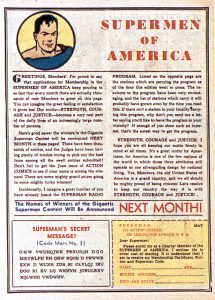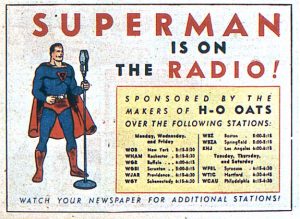As part of Super-Hearing, I want to trace how the Superman radio show was promoted in comic books. This ad from ACTION COMICS #26 is identical to the one from ACTION COMICS #25 and SUPERMAN #5, save for removal of the date material. The ads might be stagnant now, but the market is about to boom!
Archive for the ‘Super-Hearing’ Category
As part of Super-Hearing, I want to trace how the Superman radio show was promoted in comic books. This ad from SUPERMAN #25 is identical to the one from ACTION COMICS #25.
As part of Super-Hearing, I want to trace how the Superman radio show was promoted in comic books. This ad from ACTION COMICS #25 picks up largely from the one in ACTION COMICS #24, but adds listings for stations in Washington and Baltimore airing the show.
Also of note is a change in sponsor from H-O Oats to Force, a toasted wheat flakes cereal produced by the same company. Force would be the most prominent sponsor of the show during its syndicated run.
As part of Super-Hearing, I want to trace how the Superman radio show was promoted in comic books. Less than a month and a half after it debuted, the serial got its first mention in the medium that launched the character on the popular Superman of America page in ACTION COMICS #24. The text, written as though penned by Superman himself, encourages readers to not just listen to the show, but to encourage their local stations to air the program if they aren’t already.
It also refers to a list of stations currently airing the show in various markets across the United States. This list was included in a half-page ad on following page of the comic. Similar ads were run in Superman-related comics for the next couple years, so we’ll be able to somewhat chart the growth of the show through these ads.
H-O Oats, manufactured by Hecker’s Oat Cereal, was an early sponsor for the show in many markets, particularly on the East Coast of the U.S. The ad also makes it clear the transcribed show aired on different days in different markets. Airdates used for Super-Hearing are based on those researched by Michael J. Hayde for his book, “Flights of Fantasy.”
